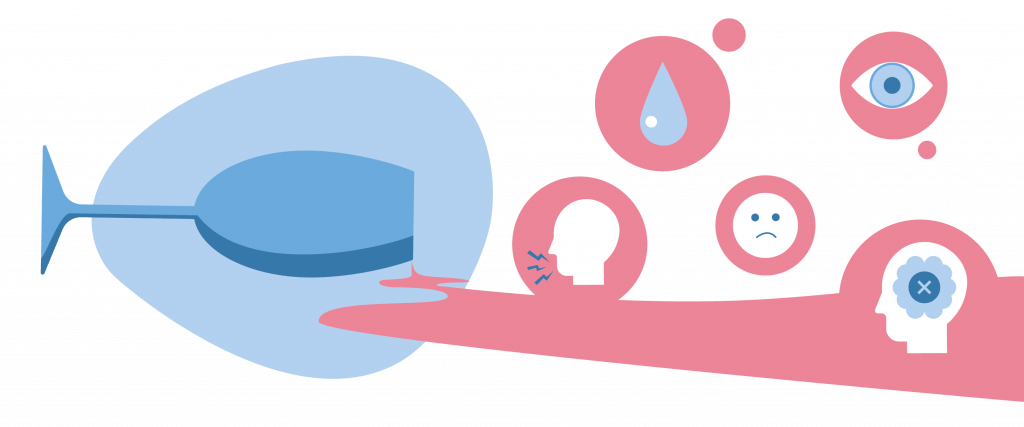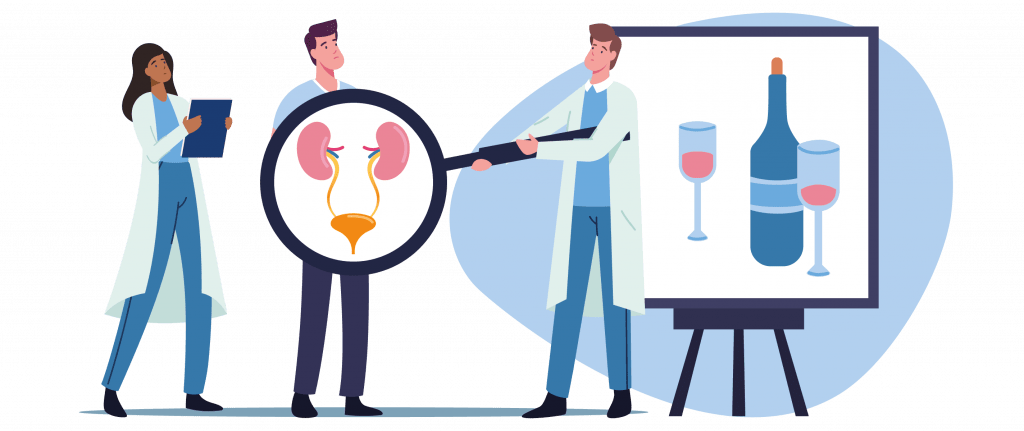Alcohol and bladder health: The long and short term effects
Most of us enjoy having the occasional glass of wine or a pint of beer in the pub with friends, but what are the long-term effects of alcohol on your overall health and your bladder health?
Short term effects of alcohol on the body
To keep health risks to a minimum, it’s recommended not to exceed 14 units of alcohol, equivalent to 6 pints of average strength beer or 10 small glasses of wine, in a week regularly.1 Nonetheless, we have all had one too many drinks on occasion at a party; so what are the short-term effects of excessive drinking? Many things can change how alcohol affects you, including your mood, what and how much you’ve eaten and how much you’ve slept the night before.2 Drinking a lot on a single occasion (or binge drinking) can increase your risk of:
- slurred speech
- lowered inhibitions
- slower reflexes and reaction times
- problems concentrating
- fluctuating emotions
- poor vision3

Long-term health risks of drinking excessive amounts of alcohol
There are also many long-term health risks linked to drinking more than the recommended weekly allowance on a regular basis. Serious conditions and illnesses that can occur after 10-20 years of regular drinking include:
- mouth, throat and breast cancer
- stroke
- heart disease
- liver disease
- brain damage
- damage to the nervous system4
In addition to these, alcohol can affect your bladder both in the long and short term.

Effects of alcohol on the bladder
Alcohol can impact your bladder health regardless of whether you have a bladder issue or not, and we will address both.
How alcohol impacts a healthy bladder
Alcohol is a powerful diuretic (something that makes you wee), meaning even just one drink can increase your urine production5and make you need to use the toilet more. It can also cause dehydration and more concentrated urine, which, in turn, causes irritation and inflammation in the lining of the bladder. 6 This causes discomfort both when you urinate and at rest.

Drinking alcohol with bladder issues
At this point, you might be wondering if alcohol has long-term effects on the bladder and if it can exacerbate existing issues (such as urinary tract infections [UTIs] and urinary incontinence)?
Does alcohol have a long-term effect on the bladder?
While there is no scientific evidence that alcohol affects bladder health in the long term, chronic drinking can cause issues that may, in turn, increase the risk of incontinence. For example, dementia has been linked with long-term alcohol misuse7, and it’s common for people with dementia to experience an overactive bladder8. However, in general, drinking alcohol doesn’t directly link with poor bladder health in the long term.
If you have an overactive bladder and experience leaks, the iD range offers affordable and discreet continence products, approved by dermatologists.

Can drinking cause UTIs or urinary incontinence?
Firstly, there is some evidence that drinking alcohol can increase the risk of developing a urinary tract infection if your urine is more concentrated, due to alcohol consumption.9
If you already have a urinary tract infection, it is recommended to avoid alcohol, as it makes your urine more acidic, which irritates the bladder10 and can worsen UTI symptoms. Additionally, fizzy drinks11 and fruit juices12 that you might use as mixers for your alcohol are also bladder irritants and should be avoided. To find out more about food and drink that can improve bladder health, check out this article.
The same advice can be applied to other bladder issues, such as an overactive bladder or urinary incontinence. As alcohol irritates the bladder, it worsens the symptoms of these conditions and can even make you wet the bed.13
Generally, drinking to excess is not good for your health, and even one drink can increase your need to wee and irritate your bladder, so it might be worth avoiding alcohol if you experience bladder issues.
If you have any concerns about your alcohol consumption, iD recommends you speak to your doctor.
Sources
1 “Low-risk drinking guidelines”, NHS inform, 28 July 2020, Source: https://www.nhsinform.scot/healthy-living/alcohol/low-risk-drinking-guidelines
2 “The risks of drinking too much”, NHS inform, 28 July 2020, Source: https://www.nhsinform.scot/healthy-living/alcohol/the-risks-of-drinking-too-much
3 “The short and long term effects of alcohol consumption on the body”, Priory, n.d., Source: https://www.priorygroup.com/blog/the-short-and-long-term-effects-of-alcohol-consumption-on-the-body
4 “The risks of drinking too much”, NHS, 23 May 2019, Source: https://www.nhs.uk/live-well/alcohol-support/the-risks-of-drinking-too-much/
5 “Alcohol and The Impact It Has on Your Bladder and Bowels”, Ruth Hilton, 8 August 2018, Source: https://www.hartmanndirect.co.uk/information-centre/alcohol-and-the-impact-it-has-on-your-bladder-and-bowels/
6 Ibid
7 “Risks: Alcohol Misuse”, NHS, 21 August 2018, Source: https://www.nhs.uk/conditions/alcohol-misuse/risks/
8 “Toilet problems, continence and dementia”, Alzheimer’s Society, 23 February 2021, Source: https://www.alzheimers.org.uk/get-support/daily-living/toilet-problems-continence
9 “Alcohol and The Impact It Has on Your Bladder and Bowels”, Ruth Hilton, 8 August 2018, Source: https://www.hartmanndirect.co.uk/information-centre/alcohol-and-the-impact-it-has-on-your-bladder-and-bowels/
10 “Why You Shouldn’t Drink Alcohol with a UTI”, Valencia Higuera, 29 August 2019, Source: https://www.healthline.com/health/urinary-tract-infection-adults/alcohol-and-uti
11 “Urinary tract infections and how to avoid them!”, NHS Kent Community Health, n.d., Source: https://www.kentcht.nhs.uk/about-us/ensuring-quality/infection-prevention-and-control/dont-dry-out/
12 “Why You Shouldn’t Drink Alcohol with a UTI”, Valencia Higuera, 29 August 2019, Source: https://www.healthline.com/health/urinary-tract-infection-adults/alcohol-and-uti
13 “COULD ALCOHOL BE CAUSING YOUR BEDWETTING PROBLEM?”, NAFC, n.d., Source: https://www.nafc.org/bhealth-blog/could-alcohol-consumption-be-contributing-to-your-incontinence-or-bedwetting-problem
